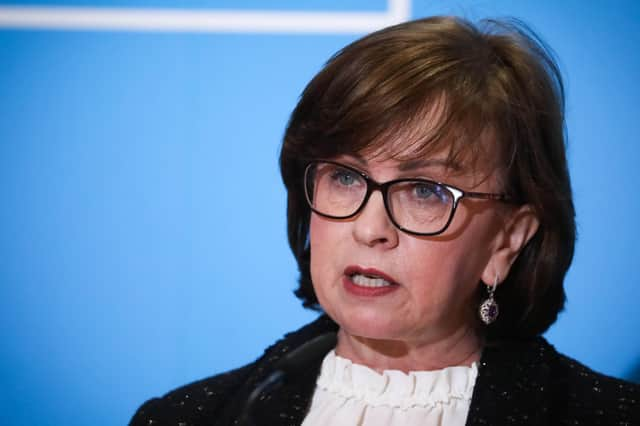Brexit: Diane Dodds says Northern Ireland protocol deal just pushes problems down the road


Diane Dodds said there remained a need to find long-term solutions to issues around export health certification and the potential of certain chilled meats being prohibited from entering Northern Ireland from Great Britain.
Last week the UK and EU agreed how the Northern Ireland protocol would operate once the Brexit transition period ends on December 31.
Advertisement
Hide AdAdvertisement
Hide AdThe protocol will see Northern Ireland remain in the EU Single Market for goods, necessitating additional regulatory checks and certifications on animal-based products entering the region from Great Britain.
Retailers had warned that food supplies could have been disrupted from January 1, with additional checks and paperwork delaying their transportation.
The agreement on the protocol’s operation will provide supermarkets with a three-month grace period to adjust to new post-Brexit Irish Sea trading arrangements.
As it stands, certain chilled meats would be banned from entering Northern Ireland from Great Britain under single market rules.
Advertisement
Hide AdAdvertisement
Hide AdAnother grace period has been agreed to allow the trade in chilled meats to continue for six months.
Mrs Dodds told members of her Assembly scrutiny committee that three and six months did not provide a lot of time to find wider resolutions.
“It’s been incredibly difficult to help businesses to get ready when in fact there has been agreements on some of these issues so late in the day,” she said.
The minister said the agreement on the protocol had resolved some issues – like dispensing with the need for most NI traders to fill out export declarations on goods moving to Britain – but she stressed it had not addressed all the concerns of the business community.
Advertisement
Hide AdAdvertisement
Hide Ad“It doesn’t resolve all of our issues, and actually puts some of the issues, just pushes them down the road a little bit,” she said.
“We’ve got to a better place on the NI/GB transfer of goods. We have managed to avoid a hard stop in relation to export health certificates and the import of goods into Northern Ireland and on the issue of chilled meats we’ve got a six-month derogation.
“Remember those are not terribly long amounts of time in which to seek proper solutions to all of the issues.”
While Northern Ireland will remain in the UK customs territory, under the terms of the protocol the region has to apply EU customs rules at its ports.
Advertisement
Hide AdAdvertisement
Hide AdThat means tariffs would be collected on goods moving from Great Britain to Northern Ireland if they were due for onward transportation to the Irish Republic.
The requirement to collect tariffs on goods deemed “at risk” of onward transportation had been a source of contention.
Mrs Dodds said the outstanding issues emphasised the need for the UK and EU to strike a comprehensive trade deal before the transition period runs out.